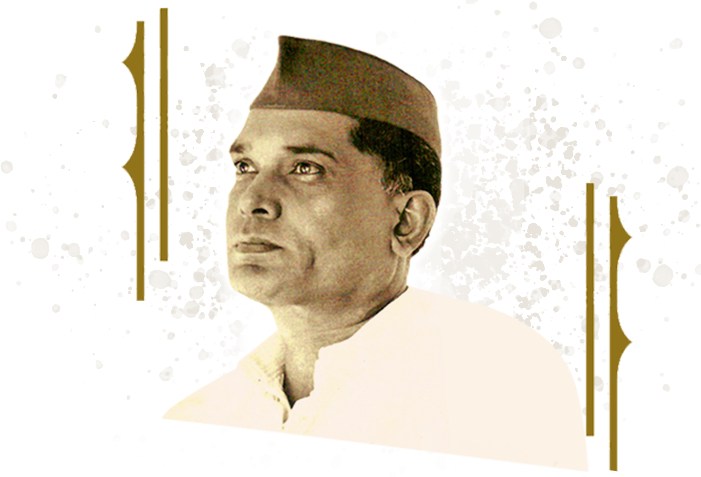1929-1932 HOME COMING
When JP returned to India at the age of 27, Gandhi was preparing for the next phase of struggle for independence. JP was as much if not more impatient than the group of younger leaders of the Congress such as Subhash Chandra Bose and somewhat more cautiously Jawaharlal Nehru, to begin the fight to capture power from the British. On returning home, he slipped back easily into the Indian attire of Kurta and Dhoti. His parent had aged considerably, sisters were married and he was unable to recognise is young brother Rajeshwar, who was barely 12 when he left. Due to his academic as well as marital status, he could have easily had a well paid job, which he needed for financial stability. He considered the possibility of opening a Department of Sociology in Banaras Hindu University, but was also eager to join the movement of independence, which meant joining Congress. Though still an orthodox Marxist, he could see that only the Congress, led by Gandhi, had the mass following that could win independence for the country. After meeting his parents he went to Gandhiji’s ashram in Wardha, where Prabhavati was living with Gandhiji and Kasturba for last seven years, while he was away. She was now 21 years old attractive and an intelligent young woman. She was like a daughter to them, more than their own children.
Despite their differences, there was enough in common to draw Gandhi and JP closer. Commitment to he cause of freedom and Prabhavati was the strongest link. Gandhi and Kasturba welcomed him as their son-in-law. Gandhi and JP travelled together from Wardha to attend Lahore session of Congress. It was in this congress of December 1929 that Jawaharlal Nehru was elected President at the age of 40, in succession to his father Motilal Nehru. It was at this session that the congress pledged to achieve total independence for the first time, the resolution was adopted at midnight on 31 December.
It was at Wardha too that JP met Jawaharlal Nehru, who was there to attend a pre-session working committee meeting. Nehru introduced himself to JP, who had long admired him as the symbol of the young progressive wing of the Congress. Their views were very similar at this stage. Nehru took to the brilliant young Marxist, 13 years his junior, straightaway.
It was not too difficult to dissuade JP from the idea of teaching at the Banaras when Nehru offered him a paid job in the Labour Research Bureau of the All India Congress Committee office at Allahabad, where he stayed with the Nehrus in Anand Bhavan. He was paid Rs 150 a month. Prabhavati joined him there. Within six months, he was acting as general secretary of the Congress and his relations with Jawaharlal became close enough for him to address him as “Bhai”. Prabhavati became a confidante of Kamla Nehru.
Gandhiji launched a countrywide civil disobedience movement on 6th April 1930 after the dramatic symbolic build-up of the Dandi salt march. This phase ended with the Gandhi-Irwin pact on 4th March 1931, which enabled the Congress party to begin functioning openly and legally again. Nehru gave JP the task of writing the history of civil disobedience movement.
Congress authorised Gandhi at its Karachi session to represent it at the second Round Table conference in London. Before he sailed in August, Lord Willingdon had replaced Irwin and a new wave of repression and arrest began. RTC conference dragged on for months. Finally, Gandhi sailed back on 26 December 1932. Nehru left Allahabad to receive Gandhi and attend party’s working committee, despite restraining orders to him from leaving Allahabad. In anticipation that he could be arrested, Nehru made JP travel with him in a separate compartment with all the important papers. As expected, Nehru was arrested en route. Now its for JP to to protact the papers and hand those over to Mrs. Sarojani Naidu and she was the incharge. JP did this all efficientaly and avoided arrest by dressing as a Parsi. After gaiving all the papers safely to Mrs. Naidu, he had to come back to Allahabad as both Prabhavati and Kamla Nehru had also been arrested. On 4th January 1932, Congress was banned as an organisation and Gandhi, along with all senior leaders, was arrested. More responsibility fell on JP. He accepted it and worked for keeping the grass route organisation active and organised the next phase of the civil disobedience movement. He travelled incognito round the country three times.
The India League in Britain sponsored a delegation of the Labour Party to look into the charges of official brutality and suppression in dealing with the Congress movement. JP accompanied them on behalf of the party in good faith that he would not be arrested when accompanying a official delegation. But he was arrested on 7th September 1932, when the group arrived in Madras and was sent to Bombay and from there to Jail in Nashik, a small pilgrimage centre 120 miles from Bombay. The Free Press Journal of Bombay headlined the report of his arrest “Congress Brain Arrested ! ”.


